20+ SAMPLE Social Media Policy
-
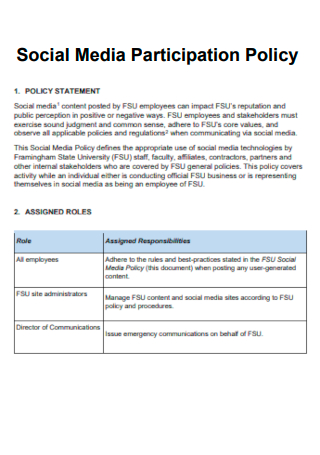
Social Media Participation Policy
download now -
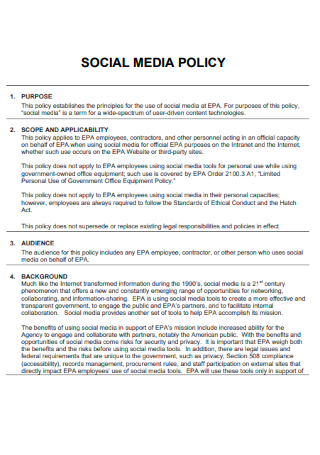
Sample Social Media Policy
download now -
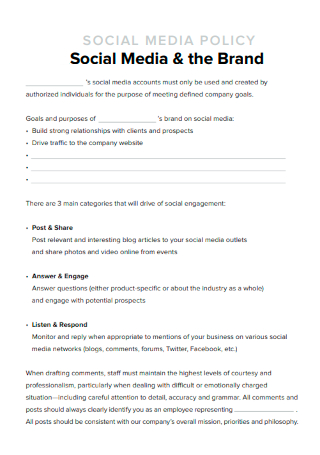
Social Media & the Brand Policy
download now -
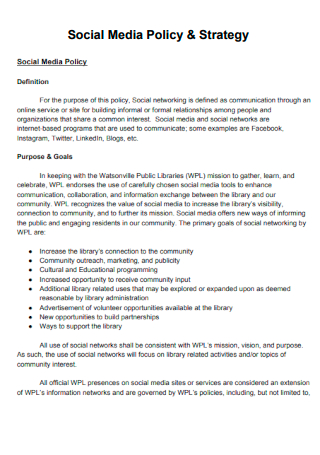
Social Media Policy & Strategy
download now -
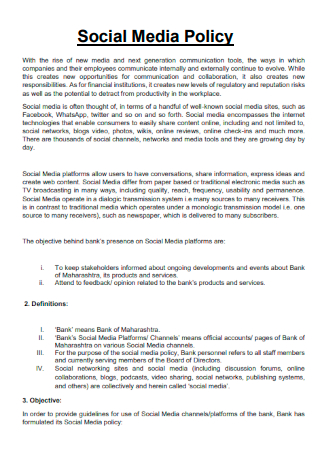
Formal Social Media Policy
download now -
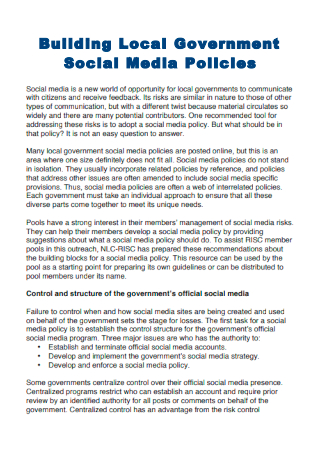
Building Local Government Social Media Policy
download now -
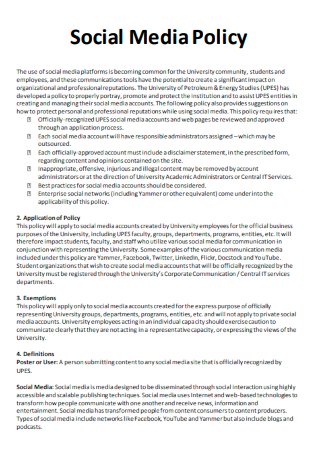
Basic Social Media Policy
download now -
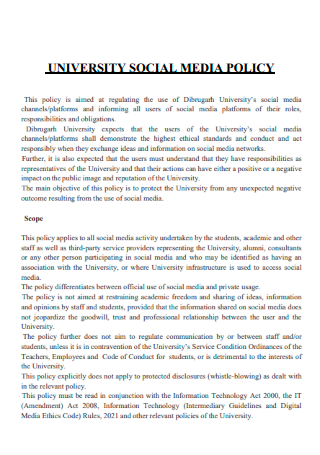
University Social Media Policy
download now -
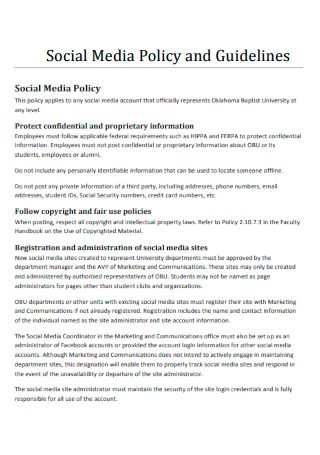
Social Media Policy and Guidelines
download now -
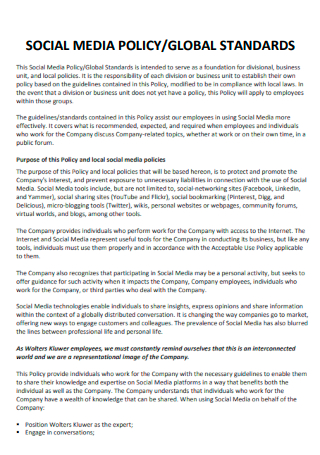
Social Media Policy and Global Standards
download now -
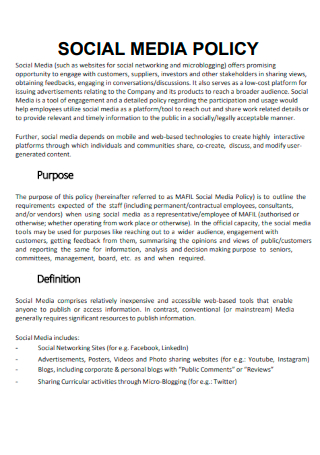
Printable Social Media Policy
download now -
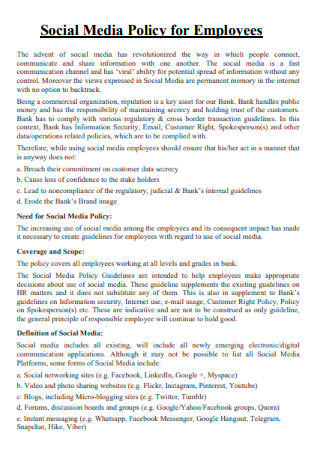
Social Media Policy for Employees
download now -
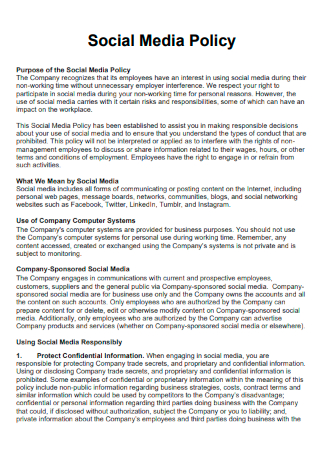
Editable Social Media Policy
download now -
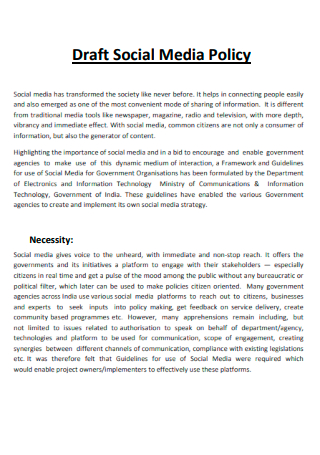
Draft Social Media Policy
download now -
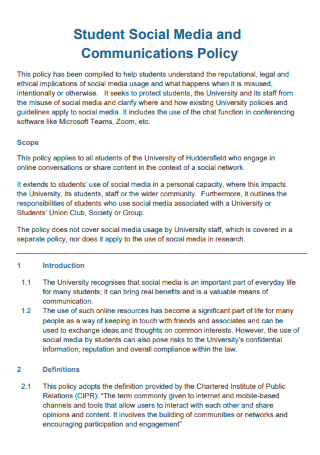
Student Social Media and Communications Policy
download now -
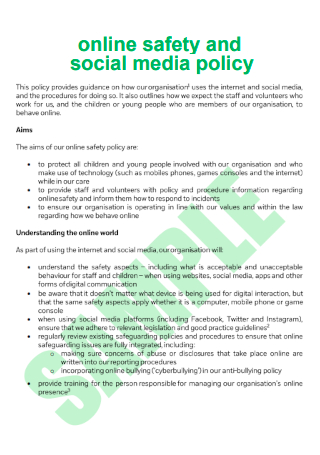
Online Safety and Social Media Policy
download now -
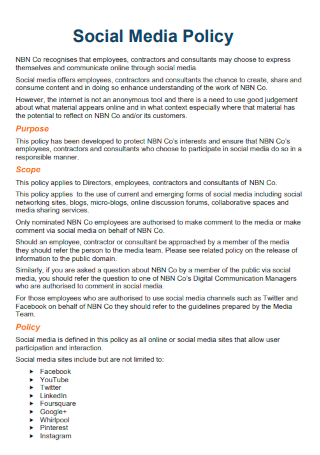
Simple Social Media Policy
download now -
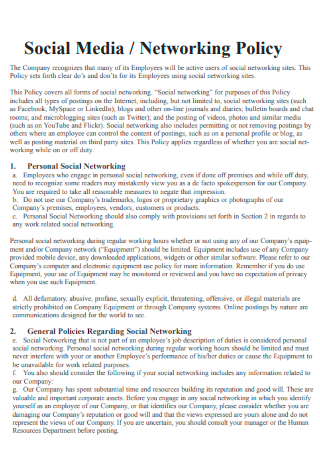
Social Media & Networking Policy
download now -
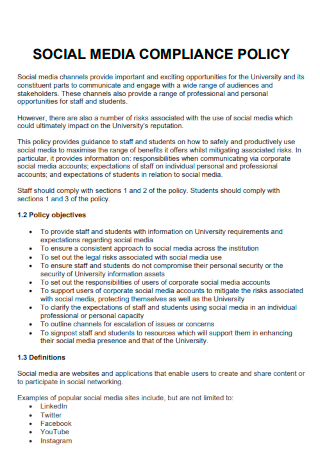
Social Media Compliance Policy
download now -
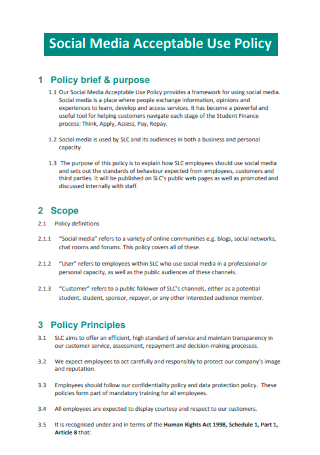
Social Media Acceptable Use Policy
download now -
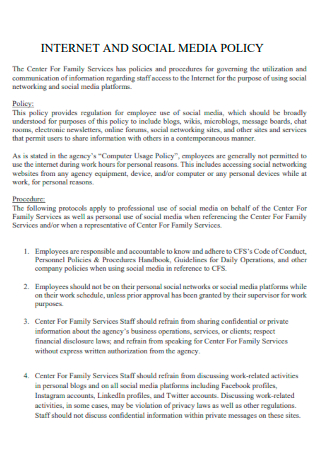
Internet & Social Media Policy
download now
FREE Social Media Policy s to Download
20+ SAMPLE Social Media Policy
What Is a Social Media Policy?
Benefits of Implementing a Social Media Policy
Social Media Policy Breach
How to Write a Social Media Policy
FAQs
What should a social media policy include?
What should not be included in a social media policy?
What leads to employees facing disciplinary action?
What Is a Social Media Policy?
A Social Media policy, also known as a social networking policy, is a business code of conduct that establishes criteria for workers who publish material on the Internet as part of their employment or as private individuals. A formal corporate social media policy is a vital document. A social media policy is intended to aid in the preservation of your brand’s voice while reducing social media dangers. Creating a social media policy may be tricky if you are unfamiliar with the process, this is where this article’s guide will come into the picture. The provision of templates will also help you out.
Benefits of Implementing a Social Media Policy
As effective as social media may be for your Brand, it is not always simple to use. For years, corporations avoided the complexities of social media compliance and security by urging their workers to shun social media. Unfortunately, most companies no longer have that option. Even if you could avoid social media, you probably won’t want to. Developing a social media policy in the workplace does not have to be frightening. All you need to do is focus on the social media policy benefits you will gain at the end and dedicate time and effort to creating an effective social media policy.
Social Media Policy Breach
A data breach can reveal a lot of information, including a company’s financial or payment information, intellectual property (IP), and its users’ financial, medical, or personal information. According to the School of Professional Advancement, fraudsters are skilled at duping social media users into passing over critical information, stealing personal data, and getting access to accounts that users believe are private. This curated list is written for you to be knowledgeable on what can be considered a breach so you will be more aware of the breach of social media policy and how to combat it.
How to Write a Social Media Policy
You may need to check out the social media policy examples for you to thoroughly prepare the social media policy and procedures especially if you are unfamiliar with the process. Not to worry though because the guide below will also help you out with each step. Continue reading through to learn more about how to create a social media policy.
1. Determine a Designated Spokesperson
The first step any policy should do is to define who can speak on your company’s behalf online. Walmart provides a detailed set of standards for social media policy examples. No ordinary employee should respond to client complaints or concerns aimed against the company. The level of autonomy you allow your employees will be determined by the type of your company. If you do allow your employees to give counsel to consumers, make sure they are well-versed in brand rules, etiquette, confidentiality, and repercussions.
2. Prepare a Plan for Dealing with Conflict
Since public mood on these channels changes so frequently, little concerns can potentially worsen if not addressed effectively. Make sure your staff knows how to respond if someone makes a nasty comment about your business online or if you find yourself in a debate. For others, the best choice will be to refer the problem to certain members of staff who have been trained to handle Public Relations and dispute resolution. Alternatively, your company’s social media policy may simply contain a set of regulations to follow. The most essential thing to tell your staff is that everything they post on social media represents the company.
3. Include Personal Account Guidelines
You may not be able to control everything your employees publish on their own social media pages. However, it is critical to demonstrate to them why their profile conduct impacts your organization and how they might prevent conflict. Whether or not your workers actively promote for you, the rest of the world will see them as a mirror of your brand. If your employees act suspiciously online, it raises questions about your firm. Set fundamental standards for how your employees should behave on social media using your company’s social media policy.
4. Consider Potential Legal Risks
There are several dangers associated with utilizing social media. The greater your workforce, the more heightened those hazards are. Your social media strategy should include explicit guidelines for dealing with sensitive situations, especially when it involves the law and business standards. Your policy must specify how to acknowledge sources, such as attributing photographs and other material. Make it clear to your staff what information is deemed secret, such as client information. When your employees use a disclaimer online, be sure they understand what it implies. Certain businesses, such as banking, government, and Healthcare, have unique regulatory challenges. Outline any restrictions that may apply to your industry.
5. Secure Your Employees
Finally, crooks and fraudsters frequently use social media. Your social media policy must contain instructions to safeguard both your employees and your organization. Make sure that everyone in your firm is attentive to internet security, whether it’s protecting against phishing schemes or ransomware assaults. Look to Intel for social media policy examples that prioritize security. The computer corporation divides its security policy into five areas, including sections on preserving trade secrets, sharing information, and applying common sense.
FAQs
What should a social media policy include?
Details on what defines a trade secret. While broad restrictions against disclosing sensitive information are rarely enforced, it is acceptable to instruct workers not to post information regarding proprietary formulae, customer lists, technological specs, and other trade secrets on their social media Sites. Specific instances of improper behavior It is not practical nor legal to control all employee social media behavior, but employers can make it clear that hate speech, bullying, retribution, and discriminatory behavior on social media platforms may result in punishment, and termination.
What should not be included in a social media policy?
Employers cannot legally prohibit their employees from discussing their occupations, complaining about coworkers, or criticizing corporate choices and regulations on social media. Employees’ ability to interact with one another on personal social media profiles is restricted. In addition, workers or prospective employees must give social network account information or passwords. Employees are also prohibited from publishing or discussing information concerning their wages, perks, or working circumstances. Any wording that forbids employees from utilizing social media to contact conventional media such as local news reporters, newspapers, and so on regarding work-related issues.
What leads to employees facing disciplinary action?
Employees that post material that is harmful to their company may be disciplined. Employees who write about their job or criticize their boss, on the other hand, have some legal protection if they are participating in protected behavior. Employees do not always have to organize as a group to engage in the concerted activity; an individual worker may also engage in collective agreements if they are acting under the jurisdiction of other workers, bringing group complaints to an employer’s attention, attempting to induce group action, or preparing for group action. The National Labor Relations Act (NLRA) applies if an employee participates in coordinated behavior on social media.
While it is necessary to have a social media policy in the business, it is clear that the quality of the policies varies. If your organization is developing a social media policy, apply the lessons you will gain from thoroughly giving this article a read to help you create a successful policy. It is important after all that you put into use the social media policy you have written as soon as it is ready to be implemented. The sooner that you do so, the sooner you or your company will be comfortable with entrusting your employees to handle the company’s brand.
